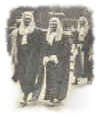Table of Contents:
Should God forgive everyone?

Could God ignore mankind wanting to go their own way?
Could God just declare a “Not guilty” verdict over the human race?
That would be like all the Judges in the courts, saying: “You are guilty, but I’ll pretend you’re not, so you are free to leave!”.
It would not be lawful, to let the guilty go free.
That would not be right for the justice of God.
Whether we accept it or not, we are all guilty and deserve the sentence.
Divine Justice could not say: “It doesn’t matter.”
Mankind would have to pay the price
It would have to be human nature that would take the blame and punishment for the sin of mankind for the justice of God to be satisfied.
It would not be lawful for a higher, or lower nature to do this.
That could be like saying: “Prisoner Smith, you have been found guilty of murder, but if we execute your pet hamster, you are a free man!”
No, human nature would have to carry the punishment.
Why Jesus came as a human
The justice of God had to be satisfied, and this was fulfilled in all it’s parts by the death of Jesus.
Let’s look at two Bible passages, which are talking about Jesus:
Since the children have flesh and blood, he too shared in their humanity so that by his death he might destroy him who holds the power of death – that is, the devil – and free those who all their lives were held in slavery by their fear of death.
Hebrews 2:14 – 3:1
For surely it is not angels he helps, but Abraham’s descendants.
For this reason he had to be made like his brothers in every way, in order that he might become a merciful and faithful high priest in service to God, and that he might make atonement for the sins of the people.
Because he himself suffered when he was tempted, he is able to help those who are being tempted.
Therefore, holy brothers, who share in the heavenly calling, fix your thoughts on Jesus, the apostle and high priest whom we confess.”
And:
Therefore, since we have a great high priest who has gone through the heavens, Jesus the Son of God, let us hold firmly to the faith we profess.
Hebrews 4:14-15
For we do not have a high priest who is unable to sympathise with our weaknesses, but we have one who has been tempted in every way, just as we are – yet was without sin.“

So Jesus Christ, the Son of God, who as God could not die, who is All powerful, who is omnipresent – that is He is everywhere all of the time – He took on human nature.
In Hebrews Christ said to God the Father:
..a body You prepared for Me, .. I have come to do Your will, O God.”
Hebrews 10:5
Adam and Eve were expelled from the Garden of Eden, Noah’s flood destroyed the old world and judgment fell upon Sodom and Gomorrah – God seems to be at war with humanity.
Moses brought in laws, lead the people out of slavery and created new worship – so did Jesus and he was greater than Moses.
Jesus is the great prayer warrior.
The Divine nature of Jesus was like the altar upon which His human nature was sacrificed.
Jesus was, and is, merciful to mankind and faithful to God.
He is merciful because He is willing to stand in the gap and mediate, between the justice of God needing to be carried out, and the condemned, guilty ones.
He was totally faithful to God, who had appointed Him as Mediator, and therefore His mediation is totally acceptable to God the Father.
His life perfectly fulfilled the Law of God, in thought, word and deed.
Just prior to the start of Christ’s earthly ministry, God the Father said:
This is My Son, whom I love; with Him I am well pleased.”
Matthew 3:17
That would have included all His childhood days, up to the point He started His earthly ministry.
Then later in His final year, God the Father repeated His approval of His Son.
Jesus lived a perfect life, for all of His life:
He was tempted in every way, just as we are, yet He was without sin.”
Hebrews 2:18
We, by our sins, had wronged God, but whatever we could have done, it would never have cleared our guilt.
Therefore only a perfect, human life could take the punishment.
Here we see the mercy and justice of God, the goodness and severity of God.
The mercy of God in that, if Christ had not gone to the cross, we would justly have to face the full judgement for our crimes.
And the severity of God, that though our sin was put upon His blameless Son, God did not spare Him, but judgement fell upon Him.
In Hebrews it says:
For Christ did not enter a man-made sanctuary that was only a copy of the true one;
He entered heaven itself, now to appear for us in God’s Presence…
But now He has appeared once for all at the end of the ages, to do away with sin by the sacrifice of Himself.”
Hebrews 9:24 & 26
Becoming family
God is not only satisfied through this sacrifice, but God also becomes a friend, to those who approach Him through Christ the High Priest.
The judgement is no longer there!
But it is more than that, we become His children and He has a special love for each child.

Jesus is the King of his Kingdom, his chosen people, his holy nation.
The people saw Jesus as a prophet, some even THE Prophet – the One promised to come and he would reveal God to them.
The Old Testament in the Bible looks forward to Jesus, the New Testament shows us Jesus as the Prophet revealing what God’s will and purpose is.
It is one thing for an undeserving, condemned sinner to be given a pardon, and quite another thing for him to be made a favourite.
That’s what we are; ‘God’s favourite’ if we trust in Jesus Christ.
Peter wrote:
You are a chosen people, a royal priesthood, a holy nation.”
1 Peter 2:9
A chosen people. This can be translated as ‘a favourite people’.
Peter continues:
A people belonging to God, that you may declare the praises of Him, who called you out of darkness into His wonderful light. Once you were not a people, but now you are the people of God, once you had not received mercy, but now you have received mercy.”
1 Peter 2:10
See the next article: What is acceptable worship – Jesus the High Priest Part 2
Or more detailed articles covering:
Seeing what God sees: Prophet Part 4
Jerusalem Times: ‘Galilean won’t rise from the dead’ says authorities
Images: thanks to The Pictorial Dictionary published by The Educational Book Company, London

